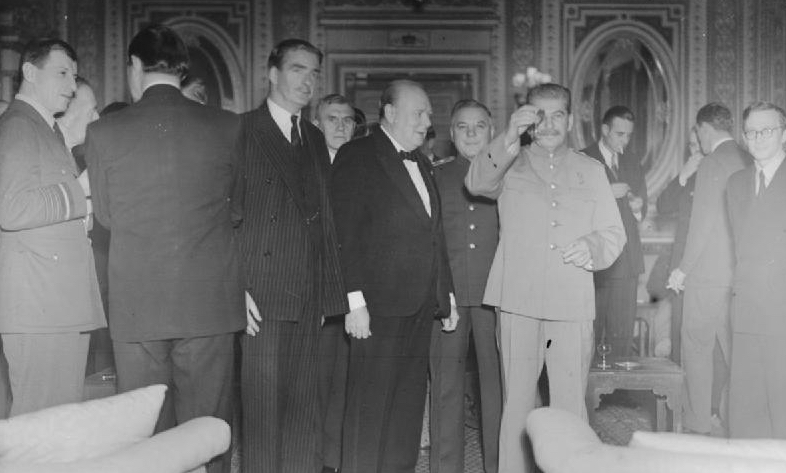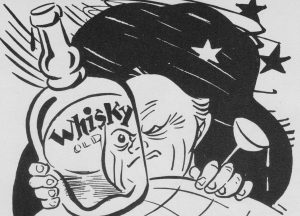
Churchill the Drunk. Or: Fasten Seatbelts on Bar Stools

Nazi propagandists, political rivals and modern-day revisionists often labeled Churchill a drunk. The accusation draws recurrent interest. Michael McMenamin’s detailed article, “The Myth of Churchill and Alcohol,” generates more comment and debate than nearly any other by the Hillsdale Churchill Project.
I recommend this piece, and the lively debate under it—a jolly tour through the underbrush of innuendo, facts, assumptions, and fake history. Click here and let the fun begin.
Some readers simply refuse to accept the evidence attesting that Churchill enjoyed alcohol and had a high capacity for it, but was not a drunk. We troubled Mr. McMenamin so often to answer their claims that I’ve lately taken to replying on his behalf. Readers may find the latest exchange amusing….
Q: Churchill’s alcohol consumption….
Reliable sources tell us that Churchill gave up “undiluted” spirits and brandy for a year to win a bet with Lord Rothermere. Since, according to all the sources, he never drank undiluted spirits anyway, that wasn’t much of an achievement. (See, e.g., Andrew Roberts, Churchill: Walking with Destiny, p.395 note, for terms of the bet.)
In The Diaries of Sir Robert Bruce Lockhart 1915-1938, WSC is drunk on at least four occasions (pp. 113, 186, 198, 352). The obsession of memoirists and fans with proving he was never drunk or was drunk once in 90 years, etc. is weird. A few observations:
1. I agree that by the usually accepted expert definitions WSC was not an alcoholic, but he did seem to have a psychological dependence. 2. Can one find a single day, even in the encyclopedic work of Martin Gilbert, when WSC drank no alcohol? 3. Can one think of any other solid or liquid substance that a healthy person can’t skip for even one day? 4. “Alcoholic” has for long been such a pejorative term. What’s wrong with just saying that WSC loved to drink various forms of alcohol, especially Champagne, but almost never seemed to observers to be intoxicated” and leaving it at that? Skip the psychiatric reference books, jiggers, definitions of “diluted,” or how old he was before he gave up riding horses….
Q: Churchill’s books: written by others?
A slight complaint: Yes, Churchill produced a large number of books, but the belief that he “wrote” them is inaccurate. It’s rather like praising The Late Queen for her speeches, when her role was not to write them but to read them. For many of WSC’s most famous books he had not only a research assistant but teams of research assistants. The method included their writing drafts and his giving those drafts the inimitable Churchill touch. That is one reason the books are so long.
A: On alcohol
The assertion that Churchill never drank undiluted spirits is denied by Andrew Roberts’ note, especially the part you left out: “So tonight is my last sip of brandy.” Lockhart’s diaries are hardly convincing. Page 113: “Winston drunk but unconvinced” in an argument about Empire Free Trade. Page 186: “Winston…slightly the worse for drink.” (Slightly?) Page 198: “Winston, I imagine, is going the same way” (as the alcoholic F.E. Smith). Page 352: “Although Winston has a bet with Rothermere not to touch spirits, he drank loads of beer and then after luncheon five large glasses of port. (No, the bet was to abstain from undiluted spirits. What are “loads”? How large is a port glass?)
Churchill did have an astonishing capacity, and most historians grant him a decided preference for lubrication. But Lockhart is no more reliable than others from Alan Brooke to Bessie Braddock, who attributed to alcohol a Churchill who worked and harangued 18 hours a day and was often exhausted…. Yet apparently not drunk enough to debate Empire Free Trade—or to spark Lockhart’s imagination.
A: On books
Comparing Churchill’s books to The Queen’s Speeches at the State Opening of Parliament is not only irrelevant but disrespectful to Her Late Majesty. Sovereigns have read speeches prepared by the government since 1852. Churchill wrote large portions of his early works in longhand (e.g. The River War, The World Crisis), researched Marlborough with the help of one assistant and A History of the English-Speaking Peoples with a handful. Dr. David Reynolds established that, while the far more complex Second World War employed a team of researchers, WSC signed off on every word, drove his publishers to apoplexy with proof revisions, and continued to make textual corrections to later editions through 1956. Not bad for an 80-year-old drunk.
As to the length of his volumes, Churchill also put out abridged and cheap editions for those unable to digest the complete text. Given your problem with length, we cordially recommend his one-volume abridgments.
Booze is the only answer: further reading
“Was Churchill an Alcoholic?” (2009)
“The Alcohol Question (Again)? (2011)
“Memo to Peggy Noonan and the WSJ: Churchill as Not a Drunk” (2018)
“Drunk and Ugly: The Perennial Question,” (2022)
Michael McMenamin, “The Myth of Churchill and Alcohol,” (2018)







One thought on “Churchill the Drunk. Or: Fasten Seatbelts on Bar Stools”
Churchill’s views on alcohol changed with age
1898:
“ A single glass of champagne imparts a feeling of exhilaration. The nerves are braced; the imagination is agreeably stirred; the wits become more nimble. A bottle produces a contrary effect. Excess causes a comatose insensibility. So it is with war; and the quality of both is best discovered by sipping.”
1930
I have been brought and trained to have the utmost contempt for people who got drunk— except on very exceptional occasions and a few anniversaries.”
1946
“I could not live long without champagne. In victory I deserve it. In defeat I need it.”
–
But none of those statements contradicts the others. -RML
Comments are closed.